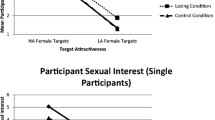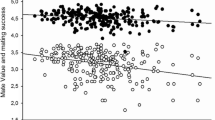Abstract
Men have been shown to discount future monetary rewards in several mating contexts, including intrasexual competition. Women, on the other hand, have not displayed differential discounting of future monetary rewards in intrasexual competition contexts. Here, we test the hypothesis that the failure to find delay discounting in women in intrasexual competition contexts may be due to the monetary nature of the reward. Women do not compete with other women for access to men based on monetary status; rather, women compete in other areas, including youthfulness and beauty. In a series of studies, we tested whether women will more steeply discount future appearance enhancing products following an intrasexual competition prime. Results indicated that the intrasexual competition prime did induce intrasexual competition, yet women did not show enhanced discounting a future gain for appearance enhancing products. We suggest that this failure to find enhanced discounting for a future gain may be due to the differential reproductive assurance for women, suggesting sensitivity to the different abundance of mating opportunities for women relative to men, as proposed by Bateman’s principle.





Similar content being viewed by others
References
Arnocky, S., Ribout, A., Mirza, R. S., & Knack, J. M. (2014). Perceived mate availability influences intrasexual competition, jealousy and mate-guarding behavior. Journal of Evolutionary Psychology, 12(1), 45–64. https://doi.org/10.1556/JEP.12.2014.1.3.
Brown, G. R., Laland, K. N., & Mulder, M. B. (2009). Bateman’s principles and human sex roles. Trends in Ecology & Evolution, 24(6), 297–304. https://doi.org/10.1016/j.tree.2009.02.005.
Buss, M. (1988). The evolution of human intrasexual competition: Tactics of mate attraction. Journal of Personality and Social Psychology, 54(4), 616–628. https://doi.org/10.1037//0022-3514.54.4.616.
Buss, D. M. (2016). The evolution of desire: Strategies of human mating (4th ed.). Basic Books, Evolution of Desire, The.
Buss, D. M., & Schmitt, D. P. (2019). Mate preferences and their behavioral manifestations. Annual Review of Psychology, 70, 77–110.
Buunk, A. P., & Fisher, M. (2009). Individual differences in intrasexual competition. Journal of Evolutionary Psychology, 7(1), 37–48. https://doi.org/10.1556/JEP.7.2009.1.5.
Du, W., Green, L., & Myerson, J. (2002). Cross-cultural comparisons of discounting delayed and probabilistic rewards. The Psychological Record, 52(4), 479–492. https://doi.org/10.1007/BF03395199.
Dunn, M. J., & Hill, A. (2014). Manipulated luxury-apartment ownership enhances opposite-sex attraction in females but not males. Journal of Evolutionary Psychology, 12(1), 1–17. https://doi.org/10.1556/JEP.12.2014.1.1.
Fiacco, S., Palm-Fischbacher, S., Campbell, J., & Ehlert, U. (2019). Measuring female intrasexual competition by the scale for intrasexual competition: A validation of the German version. Archives of Women's Mental Health, 22(2), 259–266. https://doi.org/10.1007/s00737-018-0890-6.
Figueredo, A., Vasquez, G., Brumbach, B., Schneider, S., Sefcek, J., Tal, I., Hill, D., Wenner, C., & Jacobs, W. (2006). Consilience and life history theory: From genes to brain to reproductive strategy. Developmental Review, 26(2), 243–275. https://doi.org/10.1016/j.dr.2006.02.002.
Fisher, M. L., & Archibald, N. (2019). A thousand times more beautiful: Priming competitor derogation in women. Current Psychology. https://doi.org/10.1007/s12144-019-00551-z.
Fisher, M., & Cox, A. (2011). Four strategies used during intrasexual competition for mates. Personal Relationships, 18(1), 20–38. https://doi.org/10.1111/j.1475-6811.2010.01307.x.
Green, L., & Myerson, J. (2004). A discounting framework for choice with delayed and probabilistic rewards. Psychological Bulletin, 130(5), 769–792.
Green, L., Myerson, J., Lichtman, D., Rosen, S., & Fry, A. (1996). Temporal discounting in choice between delayed rewards: The role of age and income. Psychology and Aging, 11(1), 79–84. https://doi.org/10.1037//0882-7974.11.1.79.
Griskevicius, V., Tybur, J. M., Delton, A. W., & Robertson, T. E. (2011). The influence of mortality and socioeconomic status on risk and delayed rewards: A life history theory approach. Journal of Personality and Social Psychology, 100(6), 1015–1026. https://doi.org/10.1037/a0022403.
Griskevicius, V., Tybur, J. M., Ackerman, J. M., Delton, A. W., Robertson, T. E., & White, A. E. (2012). The financial consequences of too many men: Sex ratio effects on saving, borrowing, and spending. Journal of Personality and Social Psychology, 102(1), 69–80. https://doi.org/10.1037/a0024761.
Hudders, L., De Backer, C., Fisher, M., & Vyncke, P. (2014). The Rival Wears Prada: Luxury consumption as a female competition strategy. Evolutionary Psychology, 12(3), 147470491401200. https://doi.org/10.1177/147470491401200306.
Ishii, K. (2015). Subjective socioeconomic status and cigarette smoking interact to delay discounting. SpringerPlus, 4(1), 560. https://doi.org/10.1186/s40064-015-1361-4.
Kenrick, D. T., Sadalla, E. K., Groth, G., & Trost, M. R. (1990). Evolution, traits, and the stages of human courtship: Qualifying the parental investment model. Journal of Personality, 58(1), 97–116. https://doi.org/10.1111/j.1467-6494.1990.tb00909.x.
Kirby, K. N. (2009). One-year temporal stability of delay-discount rates. Psychonomic Bulletin & Review, 16(3), 457–462.
Kirby, K. N., Petry, N. M., & Bickel, W. K. (1999). Heroin addicts have higher discount rates for delayed rewards than non-drug-using controls. Journal of Experimental Psychology: General, 128(1), 78–87. https://doi.org/10.1037/0096-3445.128.1.78.
Kruger, D. J. (2008). Male financial consumption is associated with higher mating intentions and mating success. Evolutionary Psychology, 6(4), 147470490800600.
Landolt, M. A., Lalumière, M. L., & Quinsey, V. L. (1995). Sex differences in intra-sex variations in human mating tactics: An evolutionary approach. Ethology and Sociobiology, 16(1), 3–23. https://doi.org/10.1016/0162-3095(94)00012-V.
Lawyer, S. R. (2008). Probability and delay discounting of erotic stimuli. Behavioural Processes, 79(1), 36–42. https://doi.org/10.1016/j.beproc.2008.04.009.
Lawyer, S. R., & Schoepflin, F. J. (2013). Predicting domain-specific outcomes using delay and probability discounting for sexual versus monetary outcomes. Behavioural Processes, 96, 71–78. https://doi.org/10.1016/j.beproc.2013.03.001.
Lawyer, S. R., Williams, S. A., Prihodova, T., Rollins, J. D., & Lester, A. C. (2010). Probability and delay discounting of hypothetical sexual outcomes. Behavioural Processes, 84(3), 687–692. https://doi.org/10.1016/j.beproc.2010.04.002.
Lucas, M., & Koff, E. (2017). Fertile women discount the future: Conception risk and impulsivity are independently associated with financial decisions. Evolutionary Psychological Science, 3(3), 261–269. https://doi.org/10.1007/s40806-017-0094-8.
McClure, S. M., Laibson, D. I., Loewenstein, G., & Cohen, J. D. (2004). Separate neural systems value immediate and delayed monetary rewards. Science, 306(5695), 503–507.
Myerson, J., Baumann, A. A., & Green, L. (2014). Discounting of delayed rewards: (A) theoretical interpretation of the Kirby questionnaire. Behavioural Processes, 107, 99–105. https://doi.org/10.1016/j.beproc.2014.07.021.
Penke, L., & Asendorpf, J. B. (2008). Beyond global sociosexual orientations: A more differentiated look at sociosexuality and its effects on courtship and romantic relationships. Journal of Personality and Social Psychology, 95(5), 1113–1135. https://doi.org/10.1037/0022-3514.95.5.1113.
Reimers, S., Maylor, E. A., Stewart, N., & Chater, N. (2009). Associations between a one-shot delay discounting measure and age, income, education and real-world impulsive behavior. Personality and Individual Differences, 47(8), 973–978. https://doi.org/10.1016/j.paid.2009.07.026.
Singh, D. (1995). Female judgment of male attractiveness and desirability for relationships: Role of waist-to-hip ratio and financial status. Journal of Personality and Social Psychology, 69(6), 1089–1101.
The jamovi project (2019). jamovi. (Version 1.1) [Computer Software]. Retrieved from https://www.jamovi.org.
Wilson, M., & Daly, M. (2004). Do pretty women inspire men to discount the future? Proceedings of the Royal Society of London. Series B: Biological Sciences, 271(suppl_4). https://doi.org/10.1098/rsbl.2003.0134.
Zhuang, J.-Y., & Wang, J.-X. (2014). Women ornament themselves for Intrasexual competition near ovulation, but for intersexual attraction in luteal phase. PLoS One, 9(9), e106407. https://doi.org/10.1371/journal.pone.0106407.
Author information
Authors and Affiliations
Corresponding author
Ethics declarations
Conflict of Interest
The authors declare that they have no conflict of interest.
Ethics Approval
The research reported in this paper was conducted following the ethical standards put forth by the U.S. Department of Health and Human Services Office for Human Research Protections. The research protocol was reviewed and approved by the Institutional Review Board at the institution where the research was conducted.
Informed Consent
All participants received informed consent prior to participating and were free to withdraw from the study at any time. The research reported in this paper was conducted following the ethical standards put forth by the U.S. Department of Health and Human Services Office for Human Research Protections. The research protocol was reviewed and approved by the Juniata College Institutional Review Board. All participants received informed consent prior to participating and were free to withdraw from the study at any time.
Additional information
Publisher’s Note
Springer Nature remains neutral with regard to jurisdictional claims in published maps and institutional affiliations.
Appendices
Appendix 1
Competition Vignette Examples
Imagine you have been dating your partner for 4 years. At every party, you notice this one girl, who you do not know, is always trying to get close to him and take him away from the group. As the year continues, you notice at parties he is paying less and less attention to you, and more attention to this girl. You realize they are directly flirting and they are not trying to hide it. You overhear two people talking about how they cannot believe that after the last party your partner went home with this girl.
You see your partner’s phone on a kitchen table as you walk away; it rings to indicate a text. You go to bring his phone to him in the living room but notice there is a girl’s name and a lot of hearts. Another text comes in and you see that she is calling him “sexy.” You hand him his phone, he looks at the screen, turns it off, and does not say anything.
Non-competition Vignette Examples
Imagine you have been dating your partner for 4 years. At every party, you notice this one girl, who you do not know, is always showing up at the same parties. As the year continues you notice at parties, she is flirting less with lots of guys and instead is coming with one guy in particular. You realize that these two are becoming a couple. As you left the most recent party, you overheard two people talking about how perfect they are for one another.
You see your partner’s phone on a kitchen table as you walk away; it rings to indicate a text. You go to bring his phone to him in the living room but notice there is a girl’s name. Another text comes in and you see that she is calling him for help with her computer; your partner runs a small computer tech business on the side. You hand him his phone, he looks at the screen, turns it off, and says “I can deal with that later.”
Appendix 2
Imagine that you have won a shopping spree for Product from your favorite store that sells Product.
The rules for this shopping spree are as follows:
-
1.
You will have a specific time limit for the spree; the end will be signaled by blowing a whistle
-
2.
You can only shop in the store (or department, if your favorite store selling Product is a department store) that sells Product
-
3.
You will start at the center of the store/department
-
4.
You can only take two of the same items (for example, you can take at most two L’Oreal Color Riche Matte Lipstick in Matte-Traction Red. You could pick another color of the same L’Oreal Color Riche Matte Lipstick or a different brand red lipstick)
-
5.
You must shop alone; no one can help you
-
6.
You must stop immediately when the whistle blows time
-
7.
Only items in the basket at the whistle will be free; if you are holding anything, you will not receive that item
Rights and permissions
About this article
Cite this article
Widman, D.R., Weldon, R.B. Intrasexually Competing Women Do Not Differentially Discount Future Appearance Enhancing Products. Evolutionary Psychological Science 6, 270–282 (2020). https://doi.org/10.1007/s40806-020-00241-1
Received:
Revised:
Accepted:
Published:
Issue Date:
DOI: https://doi.org/10.1007/s40806-020-00241-1




